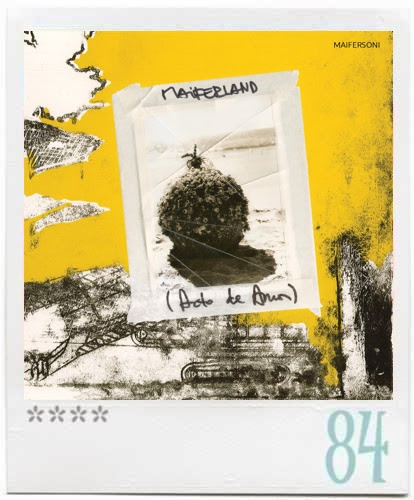Maiferland (Acto de amor), Maifersoni
Quemasucabeza, Chile
Rating: 84
by Giovanni Guillén
More than half a decade now separates us from the era of chillwave. And while the internet will forever preserve all those YouTube mixes and gratuitously tagged bandcamp albums, it’s still not quite time to look back. Not yet. For Chile’s Maifersoni, this fall into obscurity represents a tragic overlook. Ostensibly, his project met us the way dozens of others got our attention in 2010: an eye-grabbing geometric campaign led by an elusive creator, not to mention a home on one of the most consistent and beloved Chilean netlabels (Michita Rex). But the dimensions of Telar Deslizante were unique. Eventually the shoegaze/lo-fi veneer faded away revealing a sincerity that went beyond taking drugs or going on YouTube and commenting about taking drugs. Our founder/líder Carlos Reyes must have seen this when he boldly extracted the song “Nómade” and fit it into a Fonogramáticos volume where it could connect with its pop origins alongside El Guincho’s “Bombay” and Dënver’s “Olas Gigantes.”
Maifersoni returned this year with a double single ("Partners" / "Las flores más hermosas se marchitan"), marking a five year gap between his debut and new material. Despite the long gestation period, Enrique Elgueta and producer team De Janeiros knew exactly how to evolve the project. “Partners” showcased a blissful and weightless return that led to expectations of an exuberant full-length to match. Maiferland (Acto de amor), the resulting album, is much more reserved than its single led on. Yet through the weeks we have spent digesting it, the album remains as immersive and enthralling as when it was first released.
Maiferland approaches pop with a special reverence. As such, there are parallels to how someone taking on a new language would approach the task. While others would likely jump into it, awkwardly employing false cognates, settling on a short-lived charm (thus never achieving fluency), Maifersoni understands that pacing is everything. Syntax must be respected along with tenses and memorized verb forms. Opener “Partners” functions as any interjection would (a “здравствуйте” or “Hola”), a placeholder to set up a phrase of greater value. There’s flute sounds and drums working in tandem. One can almost imagine the spirit of a rave track left for the earth reclaim and for flowers to spring up. “Vuelta olímpica” brings out guitars and whistles for more carefree, pastoral pacing. The length of the song becomes a test of how long one can ward off a restless attitude (or the skip button). "Invocación" achieves this as well, but Elgueta carefully allows the composition to swell, building confidence and scaling new heights in a manner that would make Japanese artist Cornelius proud.
Elsewhere Maiferland spends considerable length courting alternative rock. “En los pastos de la plaza” marks an overcast tint to the second half of the record. The stunning “Picorocos de Guanaqueros” leads us into twilight, beginning the transition with soft notes that end up at guitar distortion, heavy percussion, and overlaid vocals through a dramatic seven minutes. A sure contender for one of the best songs of the year. Noting that, there are some missteps here and there. “Andina” sounds less like an upgrade and more of an unnecessary paint job. At 55 minutes, already a bold enough choice, the album could have cut it altogether.
It is with the penultimate track “Idahue” (which might’ve made a more fitting closer) that the record wormholes back to Telar Deslizante. Uniting his previous work to the present perhaps as a pitstop on the new journey ahead. By now it should be clear that Maifersoni’s musical instincts have not let us down. Maybe next time people will stop sleeping on those instincts.

